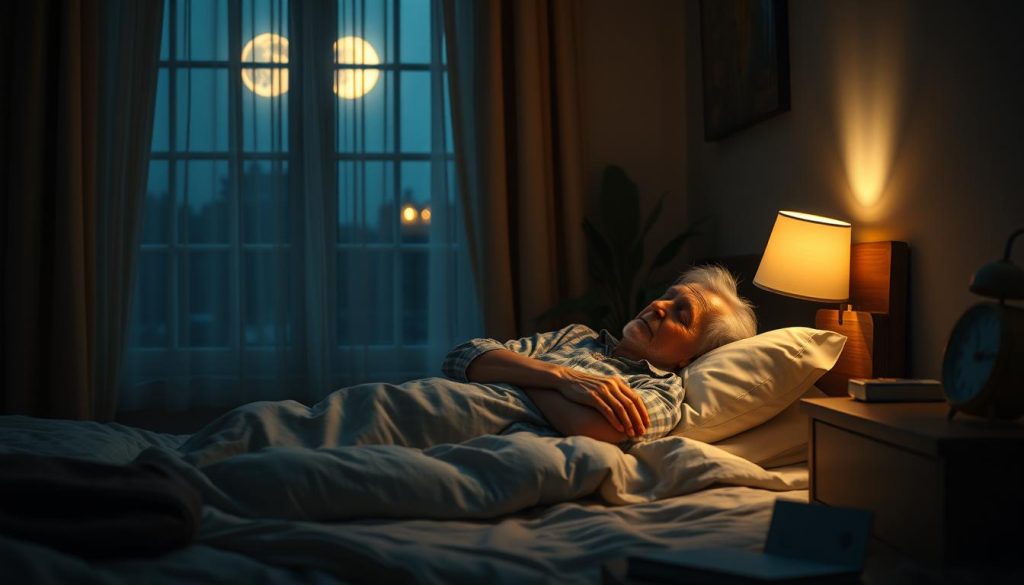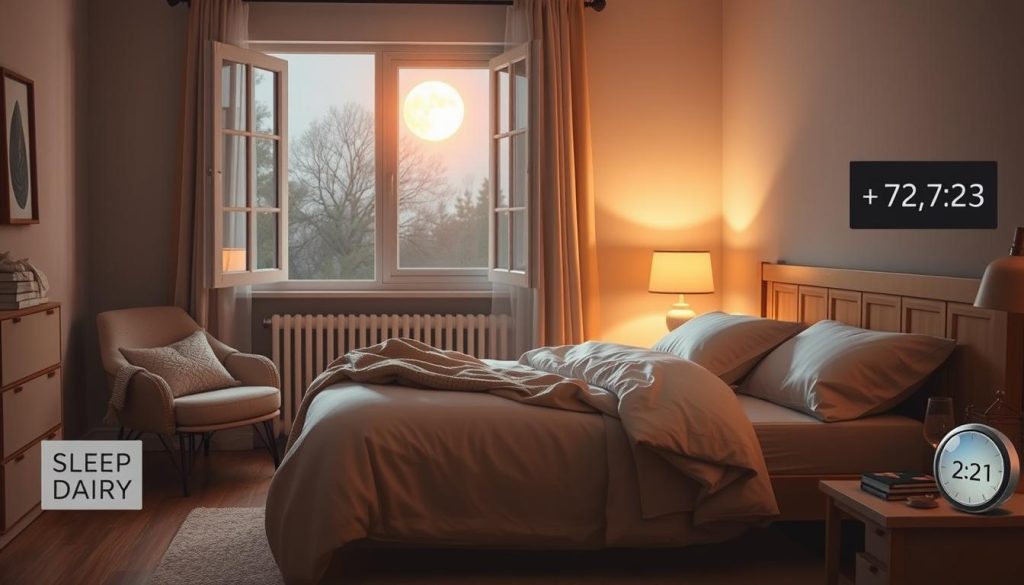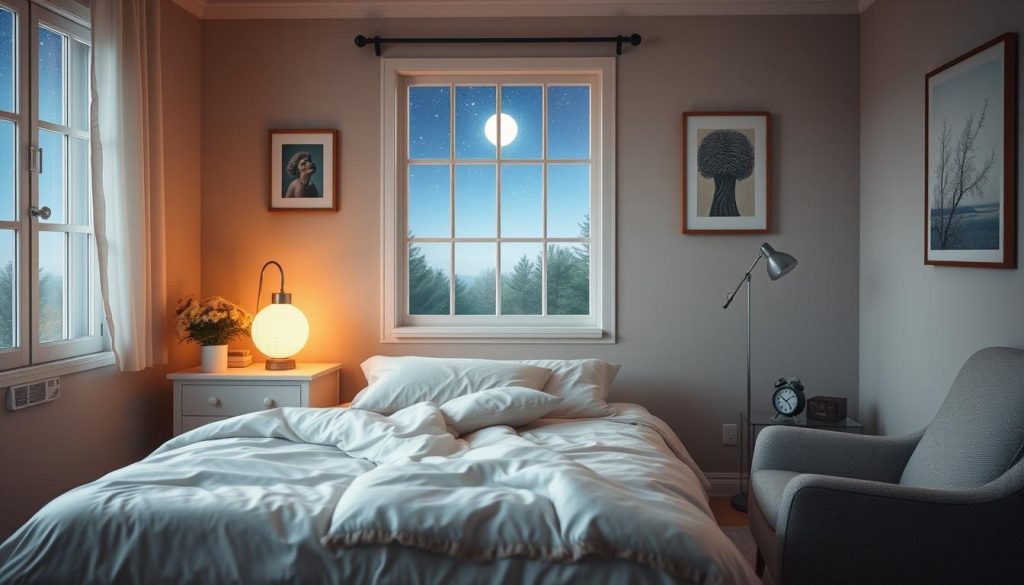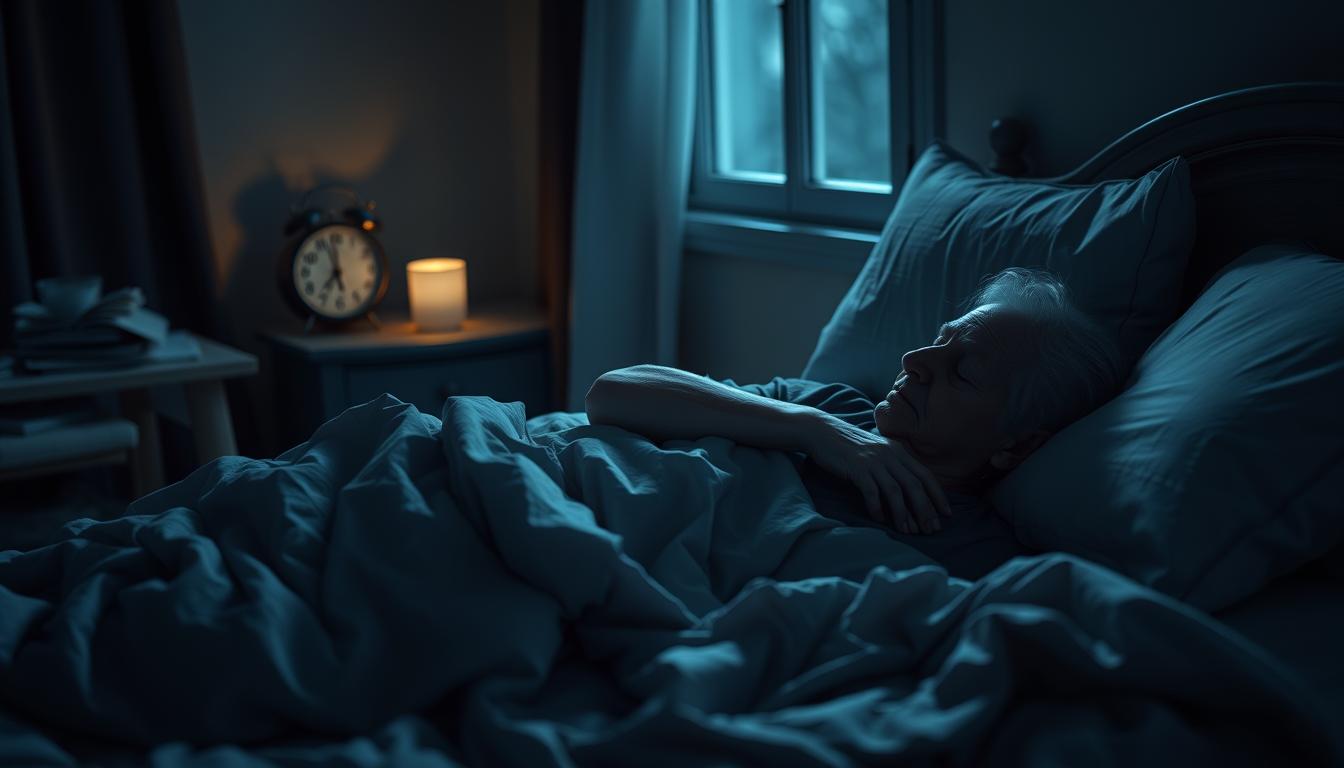As we get older, our sleep changes a lot. This article will cover common sleep problems with age, why they happen, and how to fix them. If you’re dealing with insomnia or sleep apnea, this guide has what you need to sleep better.
Sleep is key to our health, but aging can make it hard to get good rest. Knowing why and how to tackle these issues can help. It can make you feel better during the day and improve your life.
Common Age-Related Sleep Disorders
As we age, sleep issues can become a big problem. Insomnia and sleep apnea are two common ones. They can make us tired and not feel well.
Insomnia in Older Adults
Insomnia makes it hard to fall or stay asleep. It’s more common with age. Hormonal changes and health issues can cause it.
Older adults might have trouble falling asleep. They might wake up a lot at night. Getting 7-9 hours of sleep is hard for them.
Sleep Apnea and Its Impact
Sleep apnea is another big problem for older adults. It means breathing stops during sleep. This leads to tiredness during the day.
Weight gain and muscle loss can make sleep apnea worse. If not treated, it can lead to serious health problems. These include heart disease and stroke.
It’s important to know about these sleep disorders as we age. Recognizing symptoms and getting help is key. This way, we can sleep better and feel more refreshed.
Physiological Changes and Sleep in Aging
As we get older, our bodies change in many ways. These changes can affect how well we sleep. It’s important to know about these changes to help older adults sleep better.
One big change is how our internal clock works. This clock tells us when to sleep and wake up. As we age, our clock shifts, making us go to bed and wake up earlier. This can make it hard to fall and stay asleep.
Also, our hormones change with age. Melatonin is a hormone that helps us sleep. Older adults often have less melatonin. This makes it harder to fall asleep and stay asleep all night.
Older adults also sleep differently. They might not get as much deep sleep as they used to. Deep sleep is important for feeling and thinking well.
Knowing about these changes helps us find ways to improve sleep for older adults. By fixing the problems that cause sleep issues, we can help them sleep better. This improves their overall health and happiness.

Age-Related Sleep Issues: Causes and Risk Factors
As we get older, many things can make it hard to sleep well. Medical conditions and certain medicines are big factors. Knowing what causes sleep problems in older adults is key to solving them.
Medical Conditions and Medications
Medical issues are a big reason for sleep troubles in the elderly. Conditions like chronic pain, arthritis, Parkinson’s, and Alzheimer’s can mess with sleep. Also, the medicines for these problems can make sleep worse.
Some medicines, like antidepressants and pain relievers, can mess with our sleep. They can cause insomnia or make us feel very sleepy during the day. Doctors need to know how these issues affect sleep to help older adults.
| Medical Condition | Impact on Sleep | Relevant Medications |
|---|---|---|
| Chronic Pain | Difficulty falling asleep, frequent waking | Opioid pain relievers, anti-inflammatory drugs |
| Alzheimer’s Disease | Irregular sleep-wake cycles, daytime napping | Antidepressants, sleep medications |
| Sleep Apnea | Disrupted sleep, excessive daytime sleepiness | CPAP machines, oral appliances |
Diagnosing Sleep Problems in Older Adults
It’s key to find out why older adults have sleep issues. We’ll look at how to diagnose these problems. This includes sleep studies, medical checks, and other tools to find the cause of sleep troubles.
A sleep study, or polysomnogram, is a main way to find sleep disorders in the elderly. It watches brain activity, breathing, and heart rate while sleeping. This helps doctors know what sleep problem someone has, like insomnia or sleep apnea.
Medical checks are also important for diagnosing sleep issues in older adults. Doctors do a full check-up, look at medical history, and check for health problems that might cause sleep issues. They might also do blood tests or scans to find other health problems.
Other tools used to check sleep in the elderly include:
- Actigraphy, which uses a wearable device to monitor sleep-wake patterns over an extended period
- Questionnaires and sleep diaries, which help healthcare providers understand the individual’s sleep habits and patterns
- Cognitive assessments, which can identify any cognitive or neurological factors that may be impacting sleep
Using a detailed approach to diagnose sleep problems in older adults helps doctors create a treatment plan. This plan is made for each person’s needs. It aims to improve their sleep and overall health.

Improving Sleep Hygiene for Better Rest
Getting quality sleep is key for our health, especially as we age. Improving sleep hygiene is a great way to tackle sleep issues. Sleep hygiene means the habits that help us sleep well. By making our sleep space comfy and changing our lifestyle, we can sleep better.
Creating a Sleep-Friendly Environment
The place where we sleep greatly affects our rest. To make a bedroom good for sleep, follow these tips:
- Keep the room cool, between 65 and 70 degrees Fahrenheit.
- Block out light with curtains or shades.
- Use earplugs or a white noise machine to quiet the room.
- Choose a mattress and pillows that support your body well.
Optimizing our sleep space helps us fall asleep faster and sleep longer. This is key for older adults to improve their sleep hygiene.
Creating a comfy sleep space is just part of the solution. We also need to stick to a sleep schedule and make lifestyle changes. These steps help us sleep better and enjoy the many benefits of good sleep.
Cognitive Behavioral Therapy for Insomnia
As we get older, many face insomnia, a sleep disorder. It can really hurt our well-being. Luckily, cognitive behavioral therapy for insomnia (CBT-I) is a great way to fight it. It’s a non-medical treatment that helps with sleep problems.
CBT-I helps older adults sleep better by changing their habits and thoughts. It’s a therapy that helps the body get back to a natural sleep cycle. This way, people can sleep well without needing drugs.
The Key Components of CBT-I
The main parts of CBT-I for older adults are:
- Sleep hygiene education: Learning to keep a regular sleep schedule and make a comfy sleep space.
- Cognitive restructuring: Changing negative thoughts about sleep to more positive ones.
- Stimulus control: Making the bed only for sleep and not for waking up.
- Relaxation techniques: Using deep breathing or guided imagery to relax before bed.
CBT-I tackles the main causes of insomnia. It’s very effective in making sleep better for older adults. Often, they don’t need to take medication for a long time.
| Comparison: Cognitive Behavioral Therapy for Insomnia vs. Sleeping Pills | CBT-I | Sleeping Pills |
|---|---|---|
| Mechanism of Action | Addresses the underlying cognitive and behavioral factors that contribute to insomnia | Primarily targets the symptoms of insomnia through the use of sedative medications |
| Long-Term Effectiveness | Proven to provide lasting improvements in sleep quality, with benefits often maintained even after the therapy is completed | Potential for dependency and diminishing effectiveness over time, often requiring increased dosage or switching medications |
| Side Effects | Generally minimal and well-tolerated, with no risk of dependence or next-day drowsiness | May include daytime drowsiness, dizziness, memory problems, and increased risk of falls in older adults |

CBT-I lets older adults take charge of their sleep. It’s a lasting solution for sleep problems. It helps them get the rest they need for a better life.
Lifestyle Changes for Better Sleep Quality
Improving sleep hygiene is key. But, making lifestyle changes can also help. We’ll share tips on exercise, diet, and natural remedies for better sleep as we age.
Exercise and Diet Recommendations
Exercise is great for sleep in older adults. Try to do at least 150 minutes of moderate exercise weekly. This can be brisk walking, swimming, or light cycling.
Don’t do hard workouts right before bed. They can keep you awake. Instead, pick gentle activities.
What you eat matters too. Eat foods rich in nutrients like whole grains, lean proteins, fruits, and veggies. Avoid caffeine, alcohol, and big meals before bed. They can mess with your sleep.
Try adding sleep-friendly foods to your diet. These include tart cherry juice, fatty fish, and nuts.
- Engage in regular, moderate-intensity exercise for at least 150 minutes per week
- Avoid strenuous workouts close to bedtime
- Choose a balanced, nutrient-dense diet with whole grains, lean proteins, fruits, and vegetables
- Limit caffeine, alcohol, and heavy meals close to bedtime
- Incorporate sleep-promoting foods, like tart cherry juice, fatty fish, and nuts
By making these changes, older adults can improve their sleep and overall health.
When to Seek Professional Help
Many sleep problems in older adults can be fixed with lifestyle changes and self-care. But sometimes, you might need to see a doctor or sleep specialist. If you’ve tried many ways to sleep better but still struggle, it’s time to get help.
Look for these signs to know when to seek help: trouble falling or staying asleep for weeks, feeling very tired during the day, and changes in how you sleep. Also, if you think sleep apnea or another health issue is causing your sleep problems, a sleep assessment can find the cause and suggest treatment.
Seeing a sleep specialist or your doctor can lead to a detailed check-up and sleep study. You’ll get access to special treatments and therapies. This can help you sleep better and improve your health. Don’t wait to take care of your sleep and get the help you need.

